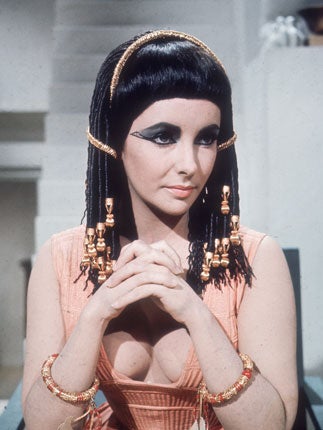Beauty Queen: What perfume did Cleopatra dab behind her ears to impress Mark Antony and Caesar?

The combined efforts of Liz Taylor and the British Museum have done a good job of familiarising us with Cleopatra's make-up techniques, namely kohl and more kohl; and we've all heard that she softened her skin by bathing in asses' milk. One element of her ancient beauty routine is missing, however. What perfume did she dab behind her ears to impress Mark Antony and Caesar?
David Pybus may have the answer. He describes himself as an aromancer – someone who works with perfumers – and his mission is to recreate ancient smells. Thanks to an appearance on Dragons' Den, he received the backing for his Scents of Time project and has just brought out four fragrances, based on Cleopatra, Tutankhamun, a lost perfume of Pompeii, and the Mayans, all available at John Lewis.
Nenúfar, billed as "The Sacred Scent of Cleopatra", evokes the fragrance of the blue lotus, which was sacred to the Pharoahs, frequently depicted on tomb walls, and had hallucinogenic properties. Pybus captured its scent using a technique called "headspace" whereby you place a big glass jar over a plant, suck out the surrounding air, then use a machine to identify its components. The result is a sweet, watery floral. He says that the perfume "is as near as we can get to the aromatic experience of the ancients"; the scent Ankh must be even more authentic, taking its make up from a temple inscription. Pybus's activities have earned him the moniker of the "Indiana Jones of the perfume industry", and at the launch of his range, Dragons' Den judge Theo Paphitis quipped that they "hope he will lead them not to the Temple of Doom but the Temple of Success". Fellow dragon Peter Jones added that he decided to back Pybus because "his concept was so unique".
There were two essential areas in which the perfumes differed from their ancient antecedents, however, and they were critical for potential commercial success. While the Egyptian perfumes contained mercury and arsenic, Pybus's versions are safe, and they are preserved using alcohol instead of the rather unglamorous ox fat.
Join our commenting forum
Join thought-provoking conversations, follow other Independent readers and see their replies
Comments